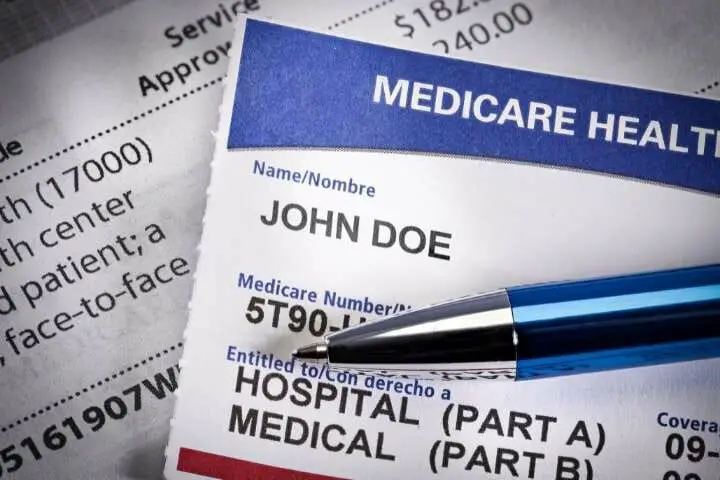There has always been some confusion between Medicare and Medicaid, and who exactly qualifies for what under which plan. Oftentimes they are used as interchangeable terms, and are thought to be the same thing but they actually are not.

For those who know that there are two different programs, they also usually think that coverage under these programs is mutually exclusive. That is to say that Americans can only receive health benefits under one or the other but not both.
The truth, however, is that there are some seniors who do qualify for coverage under both of these programs. When that happens, they are considered to be a dual-eligible beneficiary and are therefore added to both plans.
In short, yes there are some elderly citizens who can have both Medicare and Medicaid. It is still important to understand the difference of each program, and how to qualify for each one.
You might like to read: Does Medicare Pay For Diapers For The Elderly?
What Is Medicare?
This is a federal medical health program for Americans over 65 years of age, although those who have a disability or certain chronic illnesses may also qualify for these benefits.
Americans will pay into this program though their payroll taxes during their working years.
How Is Medicaid Different From Medicare?
Medicaid is a jointly funded program, by both the federal and state governments, that helps those with limited resources or low-incomes to afford health care.
While Medicare is regulated across the country, Medicaid coverage can vary drastically from state to state depending on what each state decides to cover.
These programs, though are both administered through the Centers for Medicare and Medicaid Services so that those who are on these services can get their information from one place.
How Does Dual Eligibility Work For Medicare And Medicaid?
As one might guess, there is going to be some overlap of benefits in these programs depending on the state that someone lives in.

There are also many senior citizens who are on Medicare benefits that do not have a large retirement savings and depend on social security income – which means their income is limited.
If an individual has used up all of their private financial resources and they now meet the asset or income limitations for their state, they can apply for Medicaid benefits and get dual eligibility. When this happens, these people are known as full-benefit dual-eligibles – meaning they get the full coverage from both programs for their health care needs.
There is another way to become eligible for Medicaid for seniors, though. Seniors may qualify for one of four Medicare Savings Programs which are offered at the state level to help pay Medicare’s insurance premiums and, in some cases, coinsurance and copayments.
Now these savings programs are not going to give as many benefits or as much coverage as someone who is a full-benefit dual-eligible person but they can help to significantly reduce the cost of health care.
On the other side, these Medicare Savings Programs do offer higher asset limitations and are much more flexible with their income levels than what a person would have to meet for dual-eligibility. So you can have a higher income or more private assets and still qualify for this program, meaning you do not have to exhaust all of your private retirement savings to get a little bit of help with paying for health care.
For those who apply to use a Medicare Savings programs, they are known as partial-benefit dual-eligibles.
You might like to read: How To Apply For Medicaid In Texas For The Elderly
How Are Medical Bills Paid With Dual-eligibility?
For those seniors who are on both programs, their primary benefit program will remain as Medicare. This means they can get healthcare from any provider approved as an in-network supplier, or anyone that accepts Medicare.

There are some downsides, though. The original Medicare (also known as Parts A and B) is often limited in the amount of coverage it will offer.
Therefore, if it’s affordable many people will also purchase a plan for prescription drug coverage (known as Part D) and a Medicare Supplement Insurance Policy (which is also called Medigap). Instead of purchasing Medigap, some people will purchase a Medicare Advantage Plan (which is called Part C).
It is important to note that if someone purchases a Part C plan, it’s really just another way of getting coverage from the original Medicare plan so Medicare will still stay as your primary benefit payer in those cases.
As an example, if a person has Medicare and has also purchased a Medigap plan then Medigap will function as the secondary pay of benefits.
So in this case, Medicare will pay for the healthcare received up to its coverage limits, and then Medigap will kick in to pay for the remaining balance up to its limits.
Further, if this person has also qualified for Medicaid then it will act as the tertiary benefit program and will pay any remaining balance up to its coverage limitations.
Getting The Right Benefits For You
Many people across the country are not aware that Medicare and Medigap will work together, and help to lower health care costs for those who need it.
This can be very helpful because Medicaid will often cover services and healthcare that Medicare does not.
If you are looking for help or resources with how get the right benefits for you then you can contact your local Area Agency on Aging (AAA).
These centers offer free resources and counselling, funded through the State Health Insurance and Assistance Programs, to help all seniors to understand what type of benefits Medicare and Medicaid offers.
Understanding the differences in these programs means that seniors can ensure they are getting the best coverage for them and they know exactly what they are covered for.
These benefits are there to be used, and if you don’t know they exist then you can’t use everything that’s offered to you.
You might like to read: What Is The Difference Between Medicare And Medicaid?
Do All Seniors Qualify For Medicare?
For the most part, Medicare is available to everyone who is 65 years and older and even for people who are younger than that with a disability or certain chronic illnesses.

There are two parts to Medicare: A and B. Part A is also known as hospital insurance and B is the Medicare insurance part. So Part A is used for when you need to go into a hospital for a surgery and it will give you coverage for that stay.
If you are 65 years old, or older, and you (or your spouse) has paid Medicare taxes for at least 10 years then you are eligible for premium-free Medicare.
You can also get Medicare at 65 years old, without paying premiums, in a couple other situations including
- If you are receiving retirement benefits from Social Security or the Railroad Retirement Board
- If you are eligible to receive these retirement benefits (Social Security or the Railroad Retirement Board) but haven’t yet filed your claim for them
- If you, or your spouse, has had Medicare-covered government employment
For those who did not pay Medicare taxes while they were employed, there is still an option for purchasing Part A coverage. This would be determined on a case-by-case basis, so you would need to contact your local Medicare office to confirm if you are eligible for purchasing this coverage.
Paying For Part B
The majority of people do not have to pay premiums for Part A coverage, but there is still a deductible for Part B that people will have to pay if they want the coverage.
The monthly premium for this will be automatically deducted from your Social Security, Railroad Retirement or Civil Service Retirement amount.
Alternatively, if you do not get any money from any of these three sources then Medicare will sent you a bill every 3 months with the amount to be paid for your Part B deductible.
The amount paid is $170.10 per month for people who have an income of $91,000 or less, or if you’re joint filing then your joint reported income is less than $182,000.
If your income is more than that, your Part B deductible will be more and will be determined based on what your income is.
What About Coverage For Prescription Medication?
Starting in January of 2006, everyone who has Medicare was eligible for access to coverage for prescription medications. It doesn’t matter what your income level is, your health status or what type of prescription medication you are using.

This coverage falls under Part D of Medicare benefit, and it doesn’t need to purchased separately from Medicare in the same way that Medigap needs to be.
You might like to read: How To Choose The Right Care Option For The Elderly?
In Summary
There have been many myths around Medicare and Medicaid, and who qualifies for which one. The good news, though, is that they do not have to be mutually exclusive and there are many seniors across the country who may qualify for both.If you have questions about which programs you qualify for and how to make the most of your benefits, you can visit Area Agency on Aging to make sure you know exactly what you are covered for and how to apply for both programs (if needed). Make sure you get the healthcare coverage you’re entitled to!
